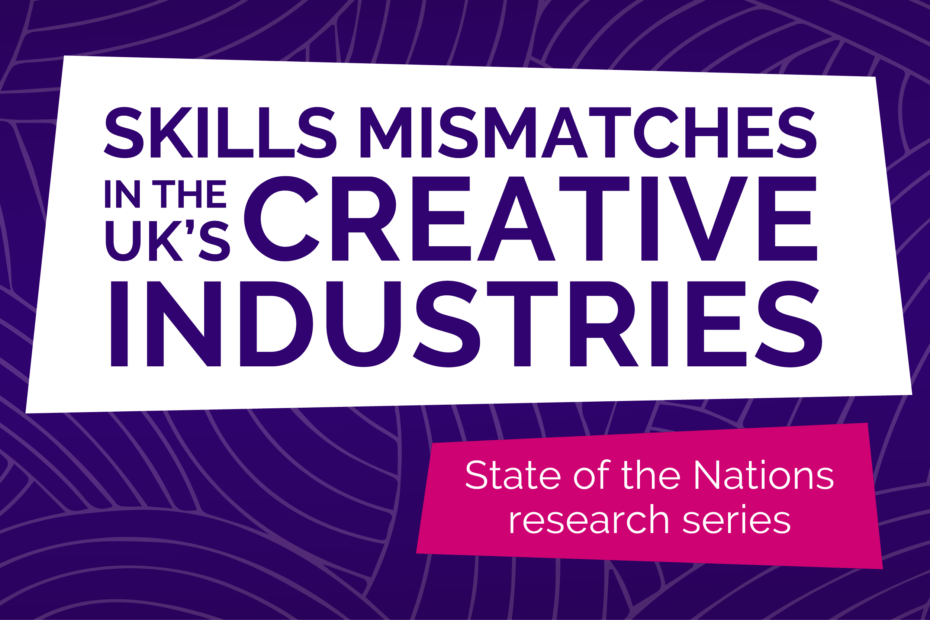Embargoed 00.01 GMT Wednesday 12 February 2025
The rapid growth of the UK’s creative industries has earned them a place in the UK government’s Industrial Strategy as a priority sector. Yet the education and skills system has not been supported to keep pace. This has led to a widening gap between the skills the workforce has and what employers say they need. This is the key finding of a new report ‘Skills Mismatches in the UK’s creative industries’ published today by the Creative Industries Policy and Evidence Centre (Creative PEC) as part of their flagship ‘State of the Nations’ series.
The report presents new evidence from official sources of labour market information (LMI) and examines employers’ perspectives on the picture and patterns of skills mismatches in the sector. It provides an important foundation for a more detailed ‘skills audit’ that the Creative PEC will launch next month, examining in greater depth the skills the creative industries need to achieve their future growth potential.
A core intention of the report published today, is to provide valuable insight to inform Skills England’s forthcoming skills assessment for the creative industries and to help direct investment and provision for the creative sector as part of developing the Creative Industries Sector Plan aligned to the government’s new Industrial Strategy, Invest 2035.
Professor Hasan Bakhshi, Director, Creative PEC says:
“The creative industries, a priority growth sector for the government, are not alone in having a skills mismatch, reflecting the wider challenges in UK education and skills, but disproportionate numbers of the sector’s ‘hard-to-fill vacancies’ are attributable to a skills shortage. We need nothing less than a system change across UK schools, technical education, universities, continuous professional development and careers pathways to enable the creative economy to realise its growth potential.”
Key report findings include:
- 65% of ‘hard-to-fill’ vacancies in the creative industries are attributable to skills shortages, compared with just 41% of ‘hard-to-fill’ vacancies across all sectors.
- Skills shortages are most pronounced for higher-skilled roles, with 78% of creative industries employers experiencing such deficiencies (in the three highest occupations), compared with 31% across all industries.
- Creative industries employers are more likely to report having to delay developing new products or services because of the skills shortages they face.
- Skills gaps among the existing creative industries workforce are on the rise, as the sector struggles to get to grips with rapid technological advancement and innovation. In 2022, nearly 60,000 creative industries workers were not fully proficient for their roles – an increase of 15,000 workers since 2017.
- Skills gaps caused by the introduction of new technology (including but not limited to AI) and the development of new products and services are a particular challenge for creative businesses.
Heather Carey, Co-Director of Work Advance, who produced the report for the Creative PEC says:
“Skills deficiencies are stymieing innovation in the UK’s creative industries. As AI, wider technological advancement and other global megatrends drive continual change in the knowledge, skills and competencies required in the workplace, there is a need for the skills system to be more agile and responsive to industry skills needs. This must go hand-in-hand with sufficient investment by creative employers and workers in upskilling and reskilling, to ensure workforce skills remain relevant, now and in the future.”
The report is the latest in the Creative PEC’s State of the Nations series which is designed to provide robust data and evidence to inform policy to support the creative industries. The Creative PEC is led by Newcastle University with the Royal Society of Arts (RSA) and funded by the Arts and Humanities Research Council (AHRC).
/ENDS
Download the report: https://pec.ac.uk/state_of_the_nation/skills-mismatches-in-the-uks-creative-industries/ (live from 00.01 Wednesday 12 February 2025, UK time)
The report ‘Skills Mismatches in the UK’s creative industries’ is published by the Creative Industries Policy and Evidence Centre, which is led by Newcastle University with the Royal Society of Arts and funded by the UKRI Arts and Humanities Research Council (AHRC).
The report authors are Lesley Giles, Director of Work Advance, Heather Carey, Director of Work Advance and Professor Dave O’Brien, Professor of Cultural and Creative Industries at University of Manchester.
The research team and spokespeople for the Creative PEC are available for comment and interview.
Press contacts
Alice Kent alice.kent@pec.ac.uk (Monday-Wednesday) and Sarah Abley (Thursday – Friday) sarah.abley@pec.ac.uk
Notes to editors
1. State of the Nations reports
The report is part of the Creative PEC’s flagship ‘State of the Nations’ series, which uses the latest data to inform policymakers on how best to support the creative sector across four thematic areas. Regular reports on each area will be published annually over the five years of the Arts and Humanities Research Council (AHRC) funding period.
2. About the Creative Industries Policy and Evidence Centre (Creative PEC)
Creative PEC works to support growth of the UK’s Creative Industries through the production of independent and authoritative evidence and policy advice. Led by Newcastle University with the Royal Society of Arts and funded by the UKRI Arts and Humanities Research Council, the Centre comprises a core consortium of; Newcastle University, Work Advance, Sussex University and the University of Sheffield. The Creative PEC works with a diverse range of industry partners.
For more details, visit http://www.pec.ac.uk and @CreativePEC
3. About The Arts and Humanities Research Council
The Arts and Humanities Research Council (AHRC), part of UK Research and Innovation, funds internationally outstanding independent researchers across the whole range of the arts and humanities: history, archaeology, digital content, philosophy, languages and literature, design, heritage, area studies, the creative and performing arts, and much more. The quality and range of research supported by AHRC works for the good of UK society and culture and contributes both to UK economic success and to the culture and welfare of societies across the globe.
4. ‘Skills Mismatches in the UK’s creative industries’ was designed by Mike Green at Green Doe Graphic Design
